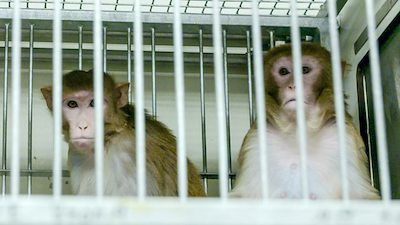BBC Documentaries
The Monkey Lab (2017x97)
:
Documentary exploring one of the world’s most heated and divisive debates: is it right to take monkeys lives to try to improve the lives of humans? Who decides what is acceptable and where do you draw the line? Despite huge advances in medicine, scientists argue that the use of monkeys in medical testing is still crucial to cure diseases such as Parkinson’s and HIV. However, anti-vivisection activists and three quarters of the British public disagree with testing on our closest animal cousins.
In this documentary we visit the Bio-Medical Primate Research Centre in the Netherlands where 200 Rhesus Macaque monkeys are used each year to help find cures to some of the world’s most deadly diseases. We meet those on the front line of this work; from the deputy director of the lab who believes their work is essential to help stop human suffering, to the animal trainers who get to know the monkeys well and have to wrestle with their emotions every day, knowing that the animals they work with will die in the research lab.
We’ll also speak to the activists who protest outside the facility daily – in the hope that one day it will be shut down.
The film also takes us into the world of the people whose lives rely on this kind of research. People like twenty seven year old Rich – who contracted HIV last year. Thanks to the last thirty years of research, of which monkey testing played a crucial role, Rich’s future looks very different to people diagnosed in the early 1980’s when the disease first started to strike.
Twenty one year old Jordan is currently on a cocktail of drugs to help treat the symptoms of his young onset Parkinson’s. However, they have terrible side effects, and Jordan is desperate for new and improved drugs. Crucial to this is the research taking place at King’s College in London, where marmoset monkeys are given the symptoms of Parkinson’s disease before being used to test new medicines.
In Oxford we meet leading neurosurgeon and advo
